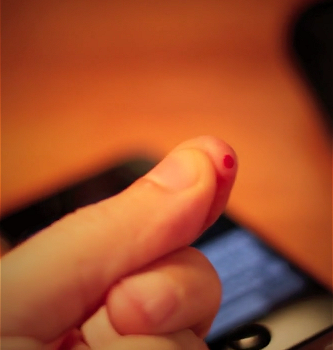 |
UMass Medical School diabetes and wound care specialists are assisting a Worcester Polytechnic Institute research team on a $1.2 million award from the National Science Foundation to develop a smart phone application for people with advanced diabetes and foot ulcers. The four-year project, organized through WPI's Healthcare Delivery Institute, is designed to help patients better manage their disease.
The proposed application, dubbed "sugar," would be installed on a smart phone and integrated wirelessly with a personal glucose meter and scale. The application would track and archive blood sugar levels and weight, and use the phone's camera to capture and analyze images of lesions known as foot ulcers, which are potentially dangerous complications that affect people with advanced, uncontrolled diabetes.
"This is an ambitious project that we hope will create a useful tool for people who are dealing with advanced diabetes," said Diane Strong, PhD, one of the project's leaders, who is a professor in WPI's School of Business and a health information technology expert. "We appreciate the National Science Foundation's support for our approach to combine technology development and clinical expertise into a unified team to address this challenge."
The WPI team will work closely with four colleagues at UMass Medical School: David Harlan, MD, the William and Doris Krupp Professor in Medicine, professor of medicine and pediatrics and co-director of the UMass Memorial Health Care Diabetes Center of Excellence; Raymond Dunn, MD, professor of surgery and chief of plastic and reconstructive surgery at UMass Memorial; Ronald Ignotz, PhD, adjunct professor of cell biology and research scientist in the Department of Surgery; and Sherry Pagoto, PhD, associate professor of medicine and a licensed clinical psychologist at the UMass Memorial Weight Center.
"Many with diabetes will tell you that managing their illness is like a second and demanding full time job. And that is especially true if complications, like foot ulcers, arise," Dr. Harlan said. "All our clinical care delivery efforts are designed to support patients so that much of their care can be delivered in the home, when it is convenient for them with their busy lives. Until we can eliminate any of our patients from suffering wound ulcers, which is our ultimate goal, we're terrifically excited by the work we're doing with the WPI team to facilitate proper wound care, and thereby avoid amputations."
Technology research and development are slated for the first two years of the project, leading to a prototype for refinement. If the development phase proceeds as planned, in the second two years of the project, the new application will be tested in a clinical trial at UMass Medical School.
The importance of managing weight and blood sugar to control diabetes is well known, so the application will have embedded data and algorithms drawn from clinical experience that will prompt patients with specific messages based on their weight and blood sugar readings over time. The application will also track the progress of a patient's foot ulcers, which are often caused by neuropathy and reduced circulation to the extremities, common complications of advanced diabetes.
Left untreated, foot ulcers can develop into serious infections that can make amputation necessary. According to the American Diabetes Association, some 70,000 people with diabetes have lower-limb amputations each year, accounting for more than 60 percent of all non-traumatic lower-limb amputations in the United States. Nearly 80 percent of foot and leg amputations in patients with diabetes result from complications from foot ulcers.
"The application will provide relevant, personalized feedback for the patient that encourages them to make good decisions," said Bengisu Tulu, PhD, assistant professor at WPI's School of Business, a health information technology expert and one of the leaders of the project.
Drs. Strong and Tulu are founding members of HDI. Also working on the sugar project are HDI executive council member Emmanuel Agu, PhD, associate professor of computer science at WPI, who will lead the software development for the new application, and Peder Pedersen, PhD, professor of electrical and computer engineering at WPI, who will work with the HDI team and direct the image processing component of the application.